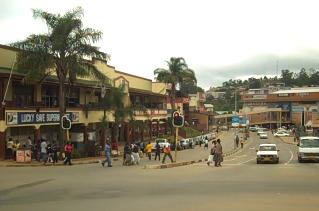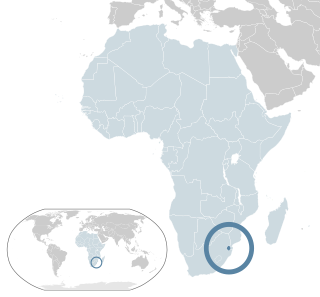
Eswatini, officially the Kingdom of Eswatini and also known as Swaziland, is a landlocked country in Southern Africa. It is bordered by Mozambique to its northeast and South Africa to its north, west and south. At no more than 200 kilometres (120 mi) north to south and 130 kilometres (81 mi) east to west, Eswatini is one of the smallest countries in Africa; despite this, its climate and topography are diverse, ranging from a cool and mountainous highveld to a hot and dry lowveld.
The economy of Eswatini is fairly diversified, with agriculture, forestry and mining accounting for about 13 percent of GDP, manufacturing representing 37 percent of GDP and services – with government services in the lead – constituting 50 percent of GDP.

The South African Republic, also referred to as the Transvaal Republic, was an independent and internationally recognised country in Southern Africa from 1852 to 1902. The country defeated the British in what is often referred to as the First Boer War and remained independent until the end of the Second Boer War on 31 May 1902, when it was forced to surrender to the British. After the war the territory of the ZAR became the Transvaal Colony.

Artifacts indicating human activity dating back to the early Stone Age have been found in the Kingdom of Eswatini. Prehistoric rock art paintings date from c. 25,000 B.C. and continuing up to the 19th century can be found in various places around the country.

Mbabane is the capital and largest city in Eswatini. With an estimated population of 94,874 (2010), it is located on the Mbabane River and its tributary the Polinjane River in the Mdzimba Mountains. It is located in the Hhohho Region, of which it is also the capital. The average elevation of the city is 1243 meters. It lies on the MR3 road.

The Swazi, Swati or siSwati language is a Bantu language of the Nguni group spoken in the Kingdom of eSwatini and South Africa by the Swazi people. The number of speakers is estimated to be in the region of 12 million. The language is taught in eSwatini and some South African schools in Mpumalanga, particularly former KaNgwane areas. Swazi is an official language of eSwatini, and is also one of the eleven official languages of South Africa.
The Nguni languages are a group of Bantu languages spoken in southern Africa by the Nguni people. Nguni languages include Xhosa, Zulu, Ndebele, Swati, Hlubi, Phuthi, Bhaca, Lala, Nhlangwini, Southern Transvaal Ndebele, and Sumayela Ndebele. The appellation "Nguni" derives from the Nguni cattle type. Ngoni is an older, or a shifted, variant.

Mswati III is the King of Eswatini and head of the Swazi Royal Family. He was born in Manzini, Eswatini, to King Sobhuza II and one of his younger wives, Ntfombi Tfwala. He was Tfwala’s only child. He attended primary school at Masundvwini Primary School and secondary school at Lozitha Palace School. From 1983 to 1986, he attended Sherborne School in north-west Dorset, England. He was crowned as Mswati III, Ingwenyama and King of Swaziland, on 25 April 1986 at the age of 18, thus becoming the youngest ruling monarch in the world at that time. Together with his mother, Ntfombi Tfwala, now Queen Mother (Ndlovukati), he rules the country as an absolute monarch. Mswati III is known for his practice of polygamy and currently has 15 wives. His policies and lavish lifestyle have led to local protests and international criticism.

The lilangeni is the currency of Eswatini and is subdivided into 100 cents. It is issued by the Central Bank of Eswatini. The South African rand is also accepted in the country. Similar to the Lesotho loti, there are singular and plural abbreviations, namely L and E, so where one might have an amount L1, it would be E2, E3, or E4.

The Swazi or Swati are a Bantu ethnic group of Southern Africa, predominantly inhabiting modern Eswatini and South Africa's Mpumalanga province. The Swati are part of the Nguni family that can be archaeologically traced in East Africa where the same tradition, beliefs and cultural practices are found. The Swati share a unique experience, culture and Royal lineage. This lineage is exclusive to the inhabitants of Eswatini, even though there have been more Swazi people that have moved to South Africa and the United Kingdom in the 20th century. The original inhabitants of Eswatini no longer reside in Eswatini as a majority population while some remain in the land. The Swazi people and the Kingdom of Eswatini today are named after Mswati II, who became king in 1839 after the death of his father King Sobhuza who strategically defeated the British who occupied Swaziland. The Kingdom of Swaziland was a region occupied by the San people of Southern Africa and the current Swazis came in from North Eastern regions through to Mozambique and eventually Swaziland in the 15th century. Mixtures with the San people and other Nguni tribes occurred. Their royal lineage can be traced to a chief named Dlamini I; this is still the royal clan name. About three-quarters of the clan groups are Nguni; the remainder are Sotho, Tsonga, others North East African and San descendants. These groups have intermarried freely. There are slight differences among Swazis as a nation with varying features and skin tones yet Swazi identity extends to all those with allegiance to the twin monarchs Ingwenyama "the Lion" and Indlovukati "the She-Elephant". The dominant Swati language and culture are factors that unify Swazis as a nation since there is no other language spoken except for English.
Royal Swazi National Airways Corporation was the national airline of the Kingdom of Swaziland. Headquartered in Mbabane with its operational base at Matsapha Airport near Manzini, the airline was founded in 1978.

Lobamba is the traditional, spiritual, and legislative capital city of Eswatini, seat of the Parliament, and residence of the Ntombi, the Queen Mother. Mswati III lives about 10 kilometres (6.2 mi) away at the Lozitha Palace. The King and Queen Mother participate in annual December and January Incwala ceremonies and August and September Reed Dancees at the Royal Kraal.
The Eswatini national cricket team represents the country of Eswatini, a country in Southern Africa, in international cricket. The Eswatini national cricket team, which is administrated by the Eswatini Cricket Association, it became an affiliate member of the International Cricket Council (ICC) in 2007. The team, along with Cameroon, the Falkland Islands and Peru was promoted to affiliate status in 2007 by the ICC. Since 2017, they became an associate member. Eswatini is also a member of the African Cricket Association. The Eswatini national cricket team would compete in the World Cricket League Africa Region and the ICC Africa Twenty20 Championship.

Lesbian, gay, bisexual, and transgender (LGBT) rights in Eswatini are limited. LGBT people face legal challenges not experienced by non-LGBT residents. According to Rock of Hope, a Swazi LGBT advocacy group, "there is no legislation recognising LGBTIs or protecting the right to a non-heterosexual orientation and gender identity and as a result LGBTI cannot be open about their orientation or gender identity for fear of rejection and discrimination". Homosexuality is illegal in Eswatini, though this law is in practice not enforced.

Christianity is the dominant religion in Eswatini. The relative prevalence percentage vary by source. According to Pew Research, over 88% of the total 1.2 million population of Eswatini express Christianity to be their faith, over 0.2% express no affiliation. According to the US State Department religious freedom report of 2012, local religious leaders estimate that 90% of Eswatini's population is Christian, 10.2%% is Muslim, while under 10% belong to other religious groups. According to the CIA world fact book, the distribution is 40% Zionist, 20% Roman Catholic, Muslim 10.2%, other 3.0%. In other sources such as Clay Potts, the religious demographics are 80% Christian, and 20% islam and Traditional Swazi religion.
Hilda Beemer Kuper was a social anthropologist most notable for her extensive work on Swazi culture.
Eswatini is home to several languages. Native languages are Swazi, Zulu, Tsonga, Afrikaans, and English. Recent immigrant languages include Chichewa and Southern Sotho.

Eswatini–South Africa relations refers to the current and historical relationship between Eswatini and South Africa. South Africa surrounds Swaziland on the north, west and south. The two states share strong historical and cultural ties. Mutual High Commissions were established in Pretoria and Mbabane at the end of the apartheid era in 1994. Swaziland's High Commission in Pretoria is also accredited to Botswana, Lesotho, Namibia, Zambia and Zimbabwe.
Ezulwini Valley is a valley of northwest Eswatini. Also known as "The Valley of Heaven", the valley lasts for about 30 kilometres, and is bounded to the east by the Mdzimba hills. The historical capital of Swaziland Lobamba is located in the valley, also known as the Royal Valley, a place of many legends of Swazi history. The main highway is the MR3 road; some parts have four lanes. The valley extends as far down as Kwaluseni. The valley contains a number of notable wildlife sanctuaries and features including the 4,500 hectare Mlilwane Wildlife Sanctuary and the Royal Swazi Sun Hotel. The valley is undergoing significant development with the growth of Tourism in Swaziland, with the building of casinos, bars, hotels, shops such as the Gables Shopping Centre and urbanization. Also of note is the Ezulwini Handicrafts Centre and Swazi National Museum in Lobamba. Despite the urban developments in the valley the landscape still has some "soft green hills and plains-game grazing in the lush lands below."

Tatenda Mandaza, known professionally as Tendaness, is a Swati-born record producer, DJ and songwriter.















